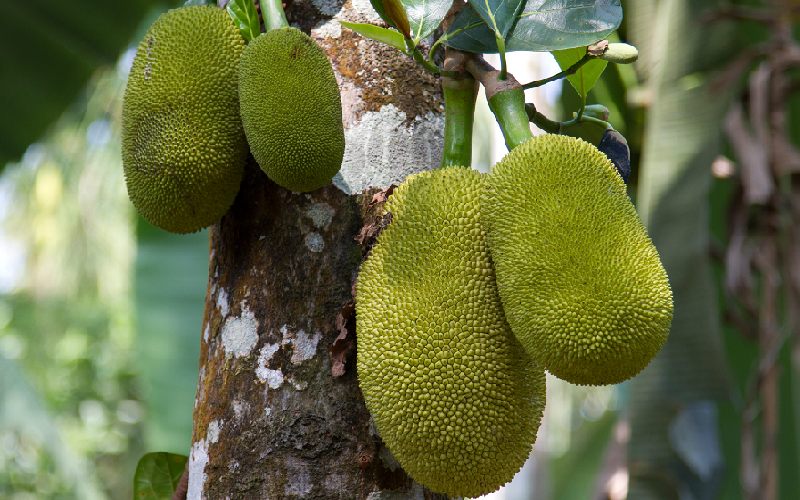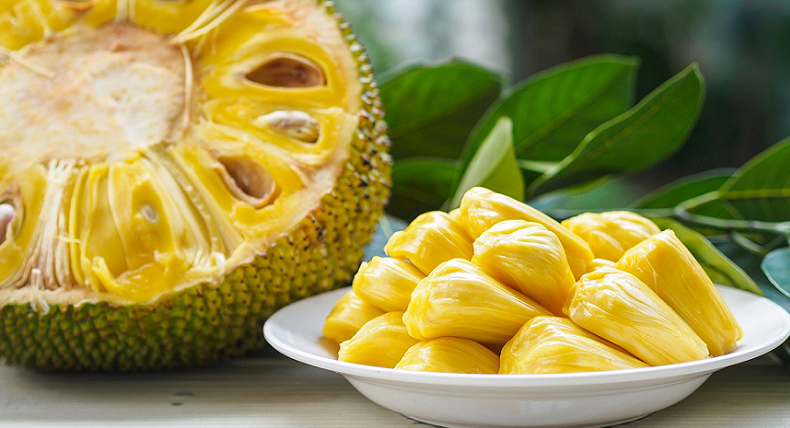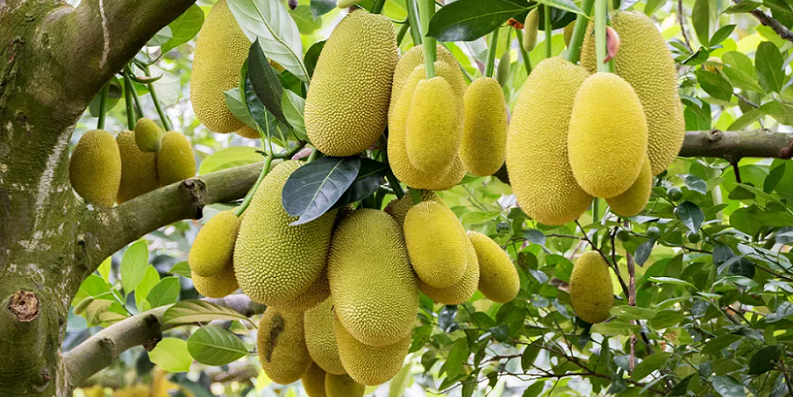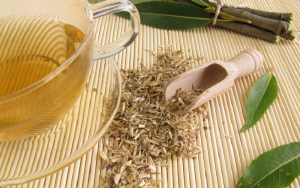
The jackfruit is a tropical fruit that has been steadily gaining popularity in Western cuisines as an intriguing meat substitute. Here we delve into the many facets of jackfruit — from its origins and nutritional content to its role as a meat alternative. We discuss the health benefits it offers, ranging from its rich nutritional profile to its potential benefits for digestive health, blood sugar control, heart health, and immune function. Whether you’re a vegan, vegetarian, or a meat-eater looking for a healthier option, jackfruit can be a nutritious and satisfying food choice.
Contents
Understanding Jackfruit: An In-Depth Look
Before we delve into the health benefits of jackfruit and its potential as a meat substitute, let’s first understand what jackfruit is, its origins, and its nutritional composition.
Origin and Cultivation of Jackfruit
The jackfruit, scientifically known as Artocarpus heterophyllus, is a tropical fruit native to South India. It’s now widely cultivated in other tropical regions of the world, including Southeast Asia, Africa, and the Americas.
Jackfruit is the largest fruit that grows on a tree, with some specimens weighing up to 80 pounds! It has a spiky, green exterior and a vibrant, yellow interior packed with edible bulbs. The fruit matures during the rainy season and is highly resistant to pests, which contributes to its widespread cultivation and availability [1].
Nutritional Content of Jackfruit
Now that we know where jackfruit comes from, let’s examine what it contains. Despite its status as a fruit, jackfruit has a unique nutritional profile that allows it to act as a meat substitute in many dishes.
Firstly, it’s important to note that jackfruit is low in calories, while providing a good source of dietary fiber. A one-cup serving of raw, ripe jackfruit provides about 155 calories, 2.4 grams of protein, 40 grams of carbohydrates, and 2.6 grams of fiber.
In terms of vitamins and minerals, jackfruit is a powerhouse. It’s rich in vitamin C, an essential antioxidant that supports immune function. It also contains significant amounts of other vitamins, such as vitamin A, B-vitamins (including folate), and vitamin E. As for minerals, jackfruit provides a good source of potassium, magnesium, and manganese, among others.
Jackfruit seeds are also edible and nutritious. They’re rich in protein, potassium, calcium, and iron. They need to be cooked before eating and can be boiled, roasted, or ground into flour.

Jackfruit as a Meat Alternative
As we’re increasingly aware of the environmental and health implications of meat consumption, many people are looking for alternatives. Jackfruit has emerged as a popular choice due to its unique texture and versatility in cooking.
Comparison of Jackfruit and Meat Protein Content
It’s important to acknowledge upfront that jackfruit does not have as much protein as most meats. However, it can still be a part of a balanced plant-based diet when paired with protein-rich foods like beans, lentils, and quinoa.
The protein content in jackfruit is around 2.4 grams per cup, which is significantly lower than what is found in an equivalent serving of meat. However, jackfruit’s nutritional profile extends beyond just protein – its high fiber content, vitamins, and minerals make it a worthy addition to your meals [2].
Texture and Taste of Jackfruit as a Meat Substitute
What makes jackfruit truly stand out as a meat substitute is its texture and taste. When cooked, unripe or young jackfruit has a texture very similar to pulled pork or shredded chicken. It’s this ‘meaty’ texture that has made jackfruit a star in the world of plant-based cooking.
As for the taste, unripe jackfruit is relatively neutral and absorbs the flavors of the spices and sauces it’s cooked with. This makes it incredibly versatile and able to be used in a wide variety of dishes, from tacos and sandwiches to curries and stews.
Cooking with Jackfruit: Tips and Techniques
To use jackfruit as a meat substitute, it’s best to buy young, unripe, or green jackfruit. This is often available canned, in water or brine, at Asian grocery stores or online.
Before cooking, the jackfruit typically needs to be drained, rinsed, and the hard core removed. From there, it can be cooked and shredded, with the end result resembling pulled or shredded meat.

Health Benefits of Jackfruit
Jackfruit is not just a culinary novelty. It’s also packed with nutrients that can offer significant health benefits.
High in Nutrients and Antioxidants
Jackfruit’s nutritional profile is quite impressive. It’s not just high in essential vitamins and minerals but also loaded with antioxidants that can promote your health [3].
Vitamin Content
Jackfruit is rich in vitamin C, an antioxidant that plays a crucial role in immune function and skin health. It also has substantial amounts of vitamin A, which is essential for vision, and several B-vitamins, including folate, which is critical for DNA synthesis and cell function. The presence of vitamin E further bolsters its antioxidant capabilities.
Mineral Content
When it comes to minerals, jackfruit doesn’t disappoint. It provides potassium, which is vital for heart and muscle function; magnesium, which is involved in numerous biochemical reactions in the body; and manganese, which is essential for metabolism and bone health, among others.
Antioxidant Properties
Antioxidants are compounds that fight off harmful free radicals in the body, helping to prevent chronic diseases and inflammation. Jackfruit is packed with several powerful antioxidants, including vitamin C, carotenoids, and flavanones, which can protect your cells from oxidative stress and inflammation.
Benefits for Digestive Health
A healthy digestive system is the foundation of overall health, and jackfruit can contribute positively to this aspect [4].
Fiber Content
Jackfruit is a good source of dietary fiber, which can promote healthy digestion by adding bulk to your diet and helping prevent constipation. Regular consumption of fiber-rich foods like jackfruit can support a healthy gut and may even contribute to weight management.
Impact on Gut Health
The fiber in jackfruit not only aids digestion but also serves as a prebiotic, providing nourishment for beneficial gut bacteria. A healthy gut microbiome is linked with numerous health benefits, from improved digestion and nutrient absorption to better immune function and mental health.
Potential Benefits for Blood Sugar Control
Jackfruit has a low glycemic index, which means it can help regulate blood sugar levels. The fiber content in jackfruit also slows the absorption of sugars into the bloodstream, helping to prevent spikes and crashes in blood sugar levels. However, more research is needed in this area to fully understand the impact of jackfruit on blood sugar control.
Potential Benefits for Heart Health
The high potassium content in jackfruit can contribute to heart health. Potassium is an essential mineral that helps regulate blood pressure levels. Consuming foods rich in potassium, like jackfruit, can help lower high blood pressure, a key risk factor for heart disease.
Potential Benefits for Immune Health
With its high vitamin C content, jackfruit can support a healthy immune system. Vitamin C stimulates the production of white blood cells, which help protect the body against infections. Additionally, the antioxidants in jackfruit can help reduce inflammation, which is often linked to chronic diseases and weakened immune function [5].

Incorporating Jackfruit into Your Diet
Now that we’ve established the numerous health benefits of jackfruit, you may be wondering how you can incorporate this versatile fruit into your diet. Thankfully, jackfruit’s neutral taste and meat-like texture make it an excellent addition to a variety of dishes.
Preparing and Cooking Jackfruit
Young, unripe jackfruit is the best choice for savory dishes due to its neutral flavor and texture. It can be found canned in water, brine, or syrup at many grocery stores or online. Be sure to select jackfruit in water or brine for savory recipes, as jackfruit in syrup is sweet and best suited for desserts.
Before cooking, drain and rinse the canned jackfruit. You’ll want to remove the hard core from each piece and can shred the remaining portion to resemble pulled or shredded meat.
Easy and Delicious Jackfruit Recipes
There are countless ways to enjoy jackfruit, from main dishes to sides. Here are a few recipe ideas to get you started.
Jackfruit Tacos
For jackfruit tacos, cook shredded jackfruit with your favorite taco seasonings and a bit of vegetable broth until the jackfruit absorbs the flavors and the broth is evaporated. Serve it in taco shells with your favorite toppings like lettuce, tomatoes, avocado, and vegan or regular cheese.
BBQ Jackfruit Sandwiches
BBQ jackfruit is a plant-based crowd-pleaser. Simply simmer shredded jackfruit with your favorite barbecue sauce until it’s heated through. Serve it on whole grain buns with a side of coleslaw for a satisfying meal.
Jackfruit Curry
Jackfruit also lends itself well to curries. Cook it with coconut milk, curry spices, and an array of vegetables for a hearty and flavorful dish. Serve the curry over rice or with naan for a complete meal.
Where to Buy Jackfruit
Fresh jackfruit can often be found in the produce section of grocery stores that carry tropical fruits. However, due to its large size, it’s more commonly bought canned. Asian supermarkets, health food stores, and online retailers are reliable sources of canned jackfruit. Remember to opt for jackfruit in water or brine for savory dishes and jackfruit in syrup for desserts.
References
[1] Jackfruit: What It Is and Why It’s Healthy
[2] What are the health benefits of jackfruit?
[3] 9 Incredible Health Benefits of Jackfruit
[4] The Top Jackfruit Health Benefits
[5] Jackfruit







